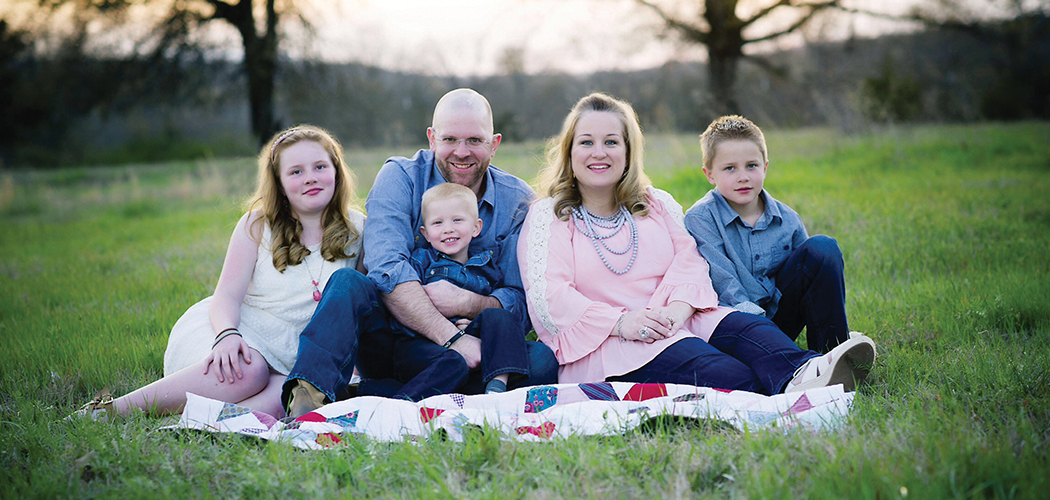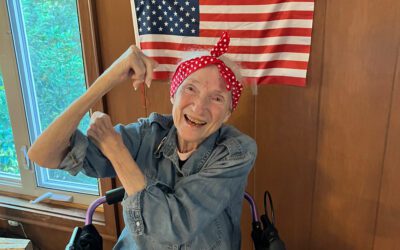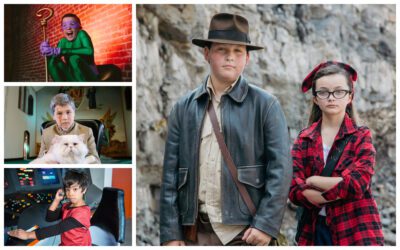[title subtitle=”words: Marla Cantrell
images:courtesy Zac and Angela Steinfeldt,
and A Moment Captured Photography”][/title]
Zac Steinfeldt sits inside a Fort Smith, Arkansas coffee shop, his long fingers wrapped around his Styrofoam cup. He is a tall man, lanky, with blue eyes and cropped brown hair. He’s dressed in a checkered shirt, and he tugs at the bill of his ball cap, once and then again. If you had to guess what he loved by what he’s wearing, you’d have two clues: he has on a necklace with a cross etched on it, and a bracelet with the words “I am second” written across the black band. The slogan is a universal code that means the wearer strives to put Jesus first in every aspect of his life.
When asked to describe himself, he does it this way: “I’m a walking, talking miracle.”
It is not until he pulls off his hat that the story becomes clearer. There is a broad scar in the shape of a “C” that splits his skull in half and then dips below one ear. Not long ago, seventy-seven staples held his head together, the marks like rambling train tracks across the lone prairie.
The story of the scar begins on a Thursday in November of 2013. Zac, who’s thirty-six, works for Traveler’s Insurance, and his office is inside the Golden Living headquarters in Fort Smith. On that day, he had a headache that he thought was a migraine. The last migraine he’d had was just before a mission trip to India the year before, after he’d been fasting for twenty-four hours, and this felt much like that one.
On Friday, the pain persisted, so he called in sick and rested at his home in Greenwood. When the weekend rolled around, he tried to push through the pain, even coaching his kids’ soccer games and teaching Sunday school. On Monday, November 10, he went back to work, determined not to let his aching head stop him. Zac’s routine was to eat lunch at his desk and then go to the gym downstairs, and so he headed there. Even though he wasn’t pushing himself, he was dizzy and sweating so much his shirt was soaked through. The headache was getting worse by then, superseding anything he’d ever felt before.
Afterward, in the dressing room, he got even sicker, and a co-worker realized something was terribly wrong. A call to 911 brought help. Zac’s memory ends soon after. He recalls being outside lying on the ground, waiting for the ambulance. The cold earth eased the throbbing in his head. “I didn’t know where I was. I thought it was Friday night, not Monday, and that I’d fallen asleep and that I was having weird dreams. I kept thinking I had soccer games in the morning, and that I’d better get to sleep. That’s the last memory I have for days and days,” he says.
His wife Angela, who has been listening intently, begins to fill in the gaps. She was at home that day, about to put their youngest down for a nap, when the phone rang. One of Zac’s co-workers was on the line. Angela, stoic up until now, brushes away tears. “They said he was incoherent, that he couldn’t talk, and that he was resisting getting into the ambulance. He wasn’t able to respond to them.” Angela pauses. “I didn’t know if he was going to make it,” she says, and Zac puts his arm around her.
Zac was airlifted to Washington Regional Medical Center in Fayetteville. A CT scan showed what was going on inside Zac’s head. He’d had a massive hemorrhage, so intense there was a two to three-centimeter mid-line shift in his brain. Doctors use a numeric scale to rate the intensity of the bleeding. Zac says anything over a five typically results in coma or death. His measurement was 8.9, and his outcome looked grim.
What was causing Zac’s bleeding was a condition called AVM (arteriovenous malformation). He points to his skull. “I had a tangle of veins and arteries right here,” he says. In people with AVM, the arteries in the brain connect directly to nearby veins without having the normal vessels (capillaries) between them. This happens as the brain is forming, and is present in less than one percent of the general population. It’s estimated that about one in 200–500 people may have an AVM, and it’s more common in males than in females.
Even as rare as the condition is, what happened to Zac is even more uncommon. “They say less than one percent of the one percent have their AVM burst like mine did. That breaks down to only one to three people a year.” He’s also learned that the persistent headache he had was a symptom he should not have ignored. It was the big warning sign he wishes he hadn’t missed.
It is at this point in the story where the extraordinary starts to reveal itself. Because this is where Dr. Brandon Evans, graduate of the University of Oklahoma College of Medicine, class of 2005, comes in. It just so happens that he’d worked under a doctor in California who had a wealth of knowledge about this disorder. “The doctor he’d studied under had done one thousand surgeries over twenty-six years on people with AVM. Many of them had not burst like mine, but he knew so much about this condition.”
Surgery started at nine that night. All the while, prayers were going up. There were posts on Facebook, and people from across the nation were asking God to help Zac. One of his friends decided he needed to be in church, and so he showed up at First Baptist in Greenwood, where he and Zac are both members, and began to pray. He told only two people he’d be there but little by little, more men showed up. They bowed their heads and asked for help. Before the night ended, sixty men had gathered to intercede for Zac.
An amazing thing was happening in the surgery waiting room as well. Peace flooded Angela’s heart. Even now she struggles to articulate the calm that she most certainly shouldn’t have felt. The two will celebrate their fifteenth anniversary this year, and that night was by far the worst time in their marriage. “It’s something I can’t even explain because my whole world was uncertain at that time. It was a peace that surpasses all understanding,” Angela says. And then she quotes her favorite Bible verse, John 16:33 “I have said these things to you, that in me you may have peace. In the world you will have tribulation. But take heart; I have overcome the world.”
When Zac was rushed into the O.R. to remove two large blood clots and stop the bleeding, the doctor estimated a twelve-hour surgery. Six and a half hours later, Dr. Evans came to find Angela. The surgery had been a success, although Zac still was in dire straits. He could have suffered a major stroke, for example, in the hours that followed, and he would likely have some trouble with his speech. But twelve days later, he was out of ICU. Not long after that, he was back home.
Because of the damage, the hemorrhage left behind, Zac found that certain words were lost to him. They put labels all over their house, identifying things as simple as doors. And when he first saw his three kids, he couldn’t recall their names. He asked them to help him, and they all filled in the blanks when he reached for words that would not come.
At first, they thought it would take him at least a year to go back to work, but in three months he returned, and he credits his bosses with helping him acclimate, saying they did everything they could to help him get back on his feet. Still, things are not quite the same. He continues to have headaches from the trauma he suffered, and he says his brain often hurts, which means there are times when he feels like he’s having a “brain freeze.” You’ve probably felt the same way after you chugged down an icy drink really fast and had a few minutes of pain. The difference is that his lasts all day long.
Even now, there are words that hover just out of his reach. He might want to say “pizza,” and in his mind, he can see an entire piece, complete with cheese and tomato sauce and a perfect crust. What he’ll end up doing is describing it until someone gives him the word.
“I saw the word ‘chemical’ spelled out on a show the other day, and I tried to say it. I’d say ‘chime-ical’ and then ‘chem-I-CAL’ and then ‘coo-mical’. I couldn’t get it. Trampoline I call a ‘bounce house,'” Zac says. Asked for a recent example, he says this: “Today at work they were serving turkey hamburgers, and they had something that comes in a package, and it’s not bread, but you eat it with a sandwich. They serve it at Subway. They’re square and lean.”
As he says this, it is as if he is a contestant in the old TV show, The Secret Password. He gives clues, and Angela listens until she comes up with the word in question. “You’re talking about Sun Chips, Zac,” she says, and you can see relief flood his face.
He has made concessions in other areas, like getting a co-coach to help with his soccer team. It takes some of the pressure off him, knowing he’s not flying solo. It’s even affected him emotionally. He avoids movies where any of the main characters die, and when he meets someone who’s lost a family member, his heart breaks. Even things he loved before, like camping, have been put on hold since there is so much planning and preparation involved. He’s finding that in all things, simple is better. His progress, however, has been remarkable and his prognosis is good. Once he’s past this, in about another year, he should be as healthy as anyone else his age.
What he’s learned through it all is that you need to honor every day, to celebrate each waking hour. “Just to see God come through the way He did takes both of us aback,” Zac says. “There’s nothing special about us. We’re just two people who love Jesus. For Him to take care of us is just amazing.”
All during the time Zac and Angela are telling their story, they are leaning into one another, they are touching each other’s hands, they are acutely aware of the other. Angela says, “As for our marriage, it’s changed that. We don’t get upset over the little things.”
“Prior to this,” Zac says, “the little things bothered us. Now they don’t. What’s the purpose of that? There’s a pile of dirty laundry? So what? Little irritations just don’t matter.”
The subject of purpose ignites something in Angela. She believes Zac was spared for a reason, and they both are praying about what to do now that they’ve been granted more time together. They want to give back, to be open to what God has in mind for them.
Zac sees that Angela has started to cry again, and he leaves to find a tissue to dry her tears. When he returns, he tells one last story. Since the surgery, most of the focus has been on Zac, and he knows that Angela’s journey was just as frightening. He is in awe of her strength, and her faith, and her devotion to him.
“I told my Sunday school class about Angela and what she went through because of me,” he says. “At the hospital, a nurse asked her if I had a Living Will. Angela said I did, and then she told them, ‘I’m not bringing it. God is going to take care of my husband.’ She knew God was going to take care of me,” he says, and then he reaches over and hugs her.
They intend to treat each other tenderly, to adore this life that is fragile, of course, but so beautiful it’s stunning to behold. As they leave, Zac’s hand is on Angela’s back. It is as if he wants to hold onto her. He reaches out to open the door for her, and she looks up at him, this man she prayed so hard for, the one she was certain God was going to save.
Symptoms of a brain AVM include:
A whooshing sound heard on examination of the skull with a stethoscope or may be audible
Seizures
Headache
Progressive weakness or numbness
Some people may experience more serious
neurological symptoms, depending on the
location of the AVM, including:
Severe headache
Weakness, numbness or paralysis
Vision loss
Difficulty speaking
Inability to understand others
Severe unsteadiness
Symptoms may begin at any age, but you’re more likely to experience symptoms between ages 10 and 40. Brain AVM can damage brain tissue over time. The effects slowly build up, sometimes causing symptoms in early adulthood.
Once you reach middle age, however, brain AVMs tend to remain stable and are less likely to cause symptoms.
Source: mayoclinic.com




